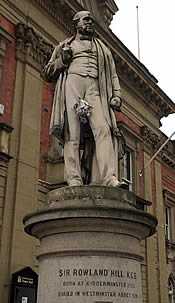Sir Rowland Hill
 Mark Andrews of Expressandstar.com wrote a nice piece on Sir Rowland Hill as the first major changes to the British postal system since 1840 took effect this week (see my post of July 31).
Mark Andrews of Expressandstar.com wrote a nice piece on Sir Rowland Hill as the first major changes to the British postal system since 1840 took effect this week (see my post of July 31).Hill was the driving force behind British postal reform and the adoption of the Penny Postage Act which was passed in August, 1839. The Penny Black, the world's first pre-paid postage stamp, was introduced in May, 1840 as one of the reform measures.
Hill was born in December, 1795. He was the third of six sons born to schoolteacher Thomas Wright Hill, and his wife Sarah.
According to Andrews, it was the fear of the postman which left its mark on young Rowland and later inspired him to come up with the idea of having the sender pay the postage with a stamp.
"At that time, it was the recipient of mail rather than the sender who was charged for the service, and the fees depended on distance. On many occasions Rowland witnessed the burden the high charges placed on the poor, and had seen his mother in fear of a letter arriving with heavy postage to be paid. On one occasion he was sent to sell a bag of rags to pay for the postage," writes Andrews.
Andrews also mentions that another one of Hill's lesser known reforms was persuading people to install a slit in their doors for the mail, so the postmen did not have to knock on each one individually.
Sir Rowland Hill died in August, 1879, and was given a full state funeral. There is a memorial to him in Westminster Abbey, and a statue of him (shown above) outside the Town Hall in his home town of Kidderminster. There's also a pub called The Penny Black in his honor.
To read the entire article, click here.





<< Home